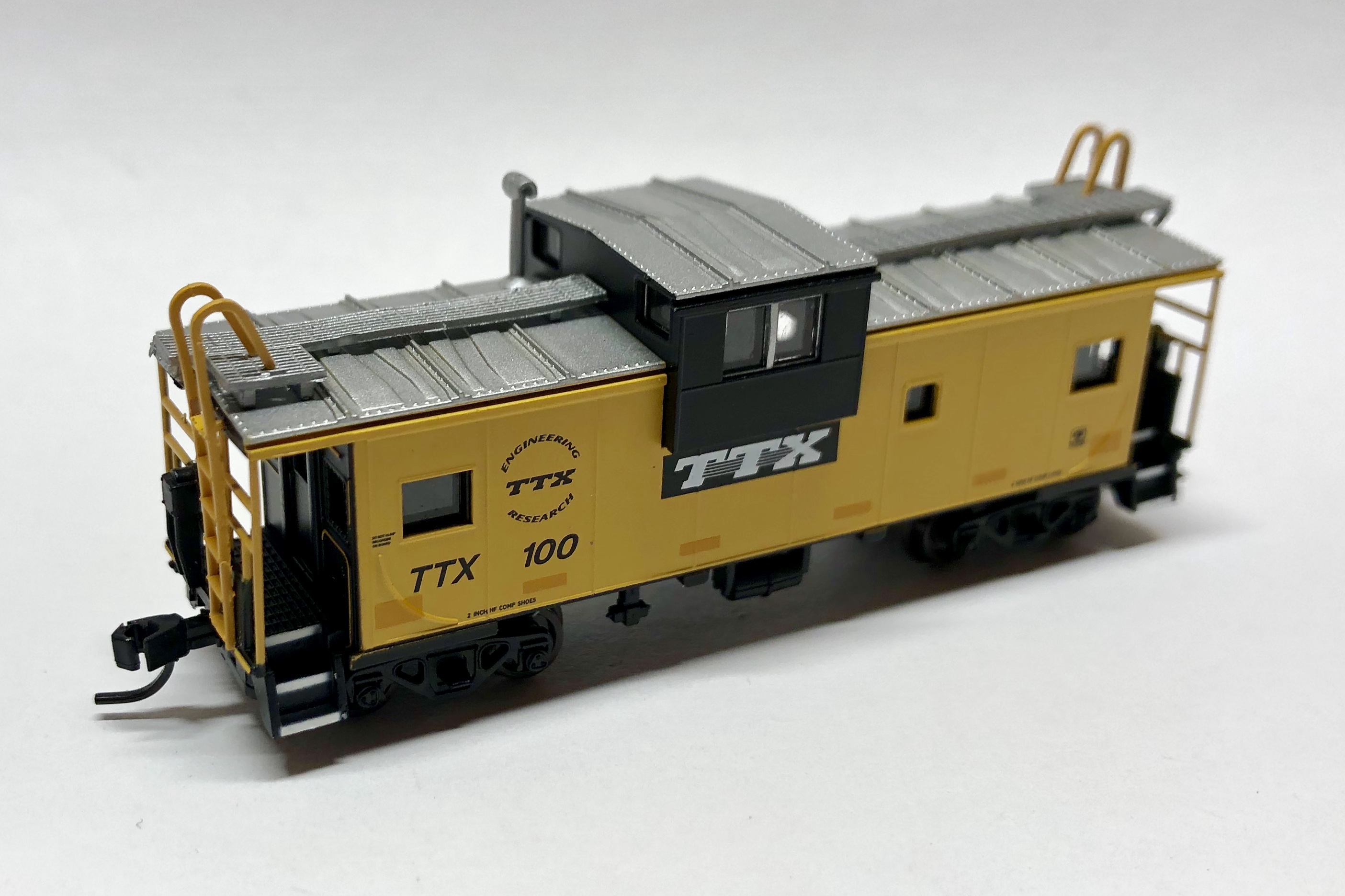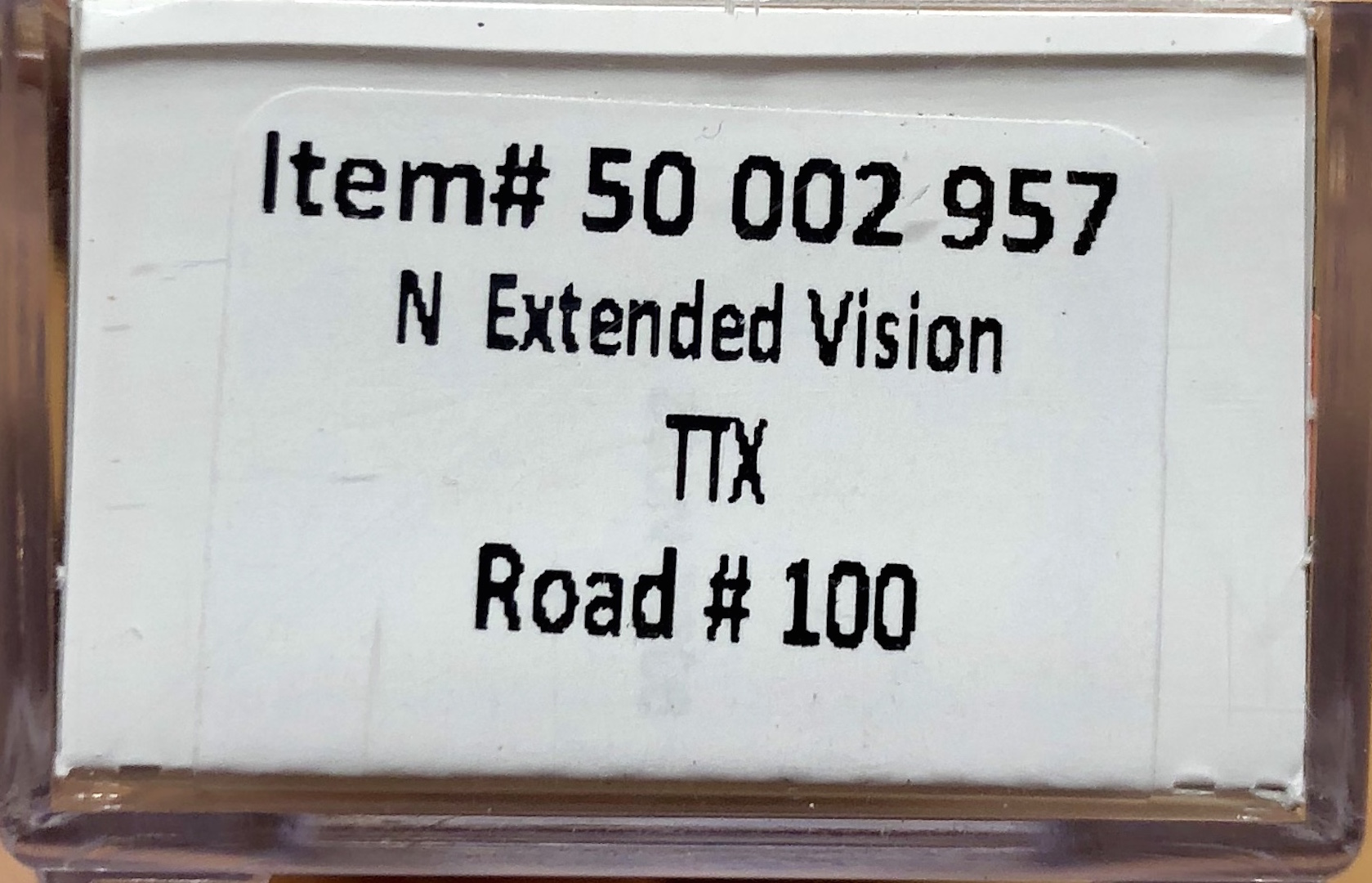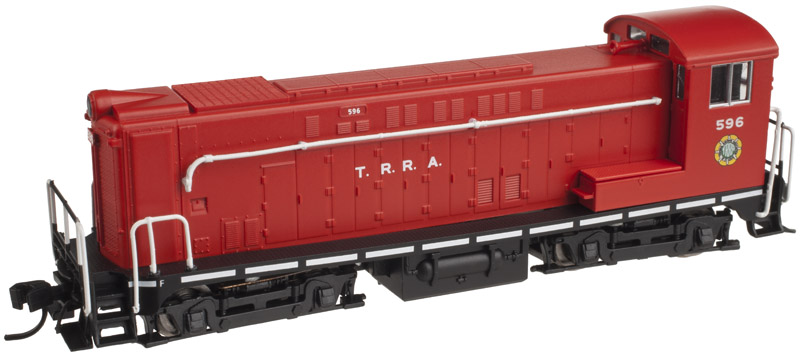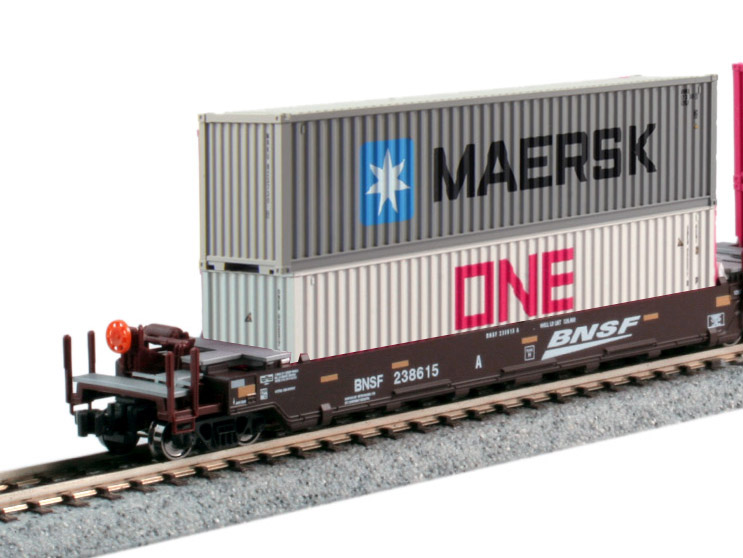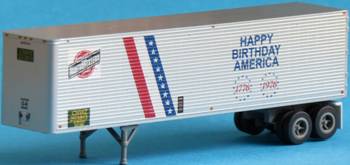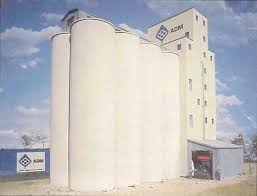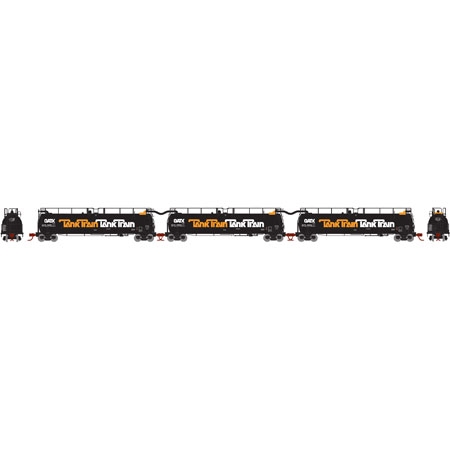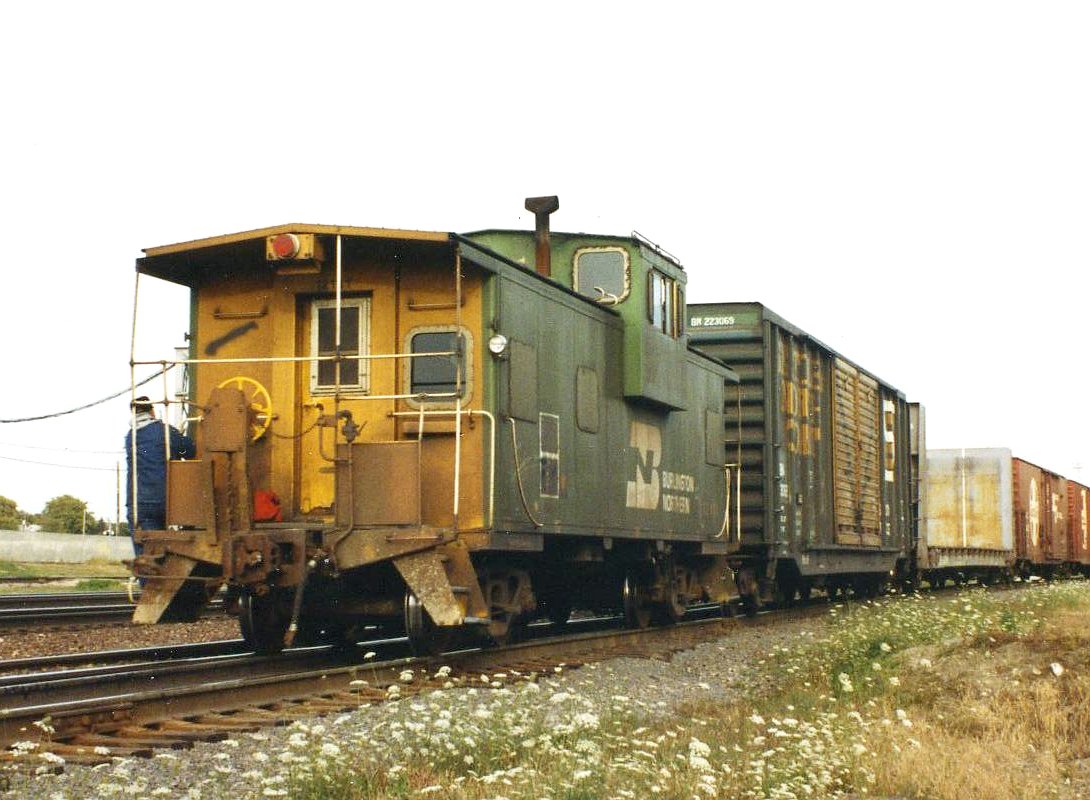Specific Item Information: TTX caboose 100 was originally built in 1972 for the Illinois Central at their Centralia, IL car shop. The IC retrofitted the caboose with equipment to monitor their locomotives, before selling it to the Trailer Train Corporation (TTX) in the late 80s. It now serves as a research and test car for the TTX to gather data on their new cars at the Transportation Technology Center in Pueblo, Colorado, but also will room around the country testing new cars in service. The TTX 100 would look right at home bringing up the rear of any intermodal train on your layout.
Model Information: Atlas released the "30" series extended vision caboose in 1996. This model is very similar to the "43" series cupola caboose in most respects. It can be easily distinguished from the standard cupola caboose in that the cupola is wider than the body on the "30" series - hence the name "Extended Vision". This model may or may not have "loop-over" ladders.
It is re-released every other year (approximately). The original releases sported Rapido hook couplers, but interestingly the 1999 release had versions with Rapido as well as versions with real (licensed) Magnematic couplers. As of the 2009 run, it comes with Accumate couplers (only).
The current release from Atlas features:
It is re-released every other year (approximately). The original releases sported Rapido hook couplers, but interestingly the 1999 release had versions with Rapido as well as versions with real (licensed) Magnematic couplers. As of the 2009 run, it comes with Accumate couplers (only).
The current release from Atlas features:
- Thin endrails
- Window glazing
- Separate brake cylinder
- Open smoke stack
- Triple valve and air reservoir
- Roller-bearing caboose trucks
- Roofwalk where appropriate
- Accurate painting and lettering
- Now with AccuMate couplers
Prototype History: In the extended-vision or wide-vision caboose, the sides of the cupola project beyond the side of the car body. Rock Island created some of these by rebuilding some standard cupola cabooses with windowed extensions applied to the sides of the cupola itself, but by far, the greatest number have the entire cupola compartment enlarged. This model was introduced by the International Car Company and saw service on most U.S. railroads. The expanded cupola allowed the crew to see past the top of the taller cars that began to appear after World War II, and also increased the roominess of the cupola area.
Additionally, Monon Railroad had a unique change to the extended-vision cabooses. They added a miniature bay to the sides of the cupola to enhance the views further. This created a unique look for their small fleet. Seven of the eight Monon-built cabooses have been saved. One was scrapped after an accident in Kentucky. The surviving cars are at the Indiana Transportation Museum (operational), the Indiana Railway Museum (operational), the Kentucky Railway Museum (fire damaged), and the Bluegrass Railroad Museum (unrestored but servicable). The remaining three are in private collections.
Additionally, Monon Railroad had a unique change to the extended-vision cabooses. They added a miniature bay to the sides of the cupola to enhance the views further. This created a unique look for their small fleet. Seven of the eight Monon-built cabooses have been saved. One was scrapped after an accident in Kentucky. The surviving cars are at the Indiana Transportation Museum (operational), the Indiana Railway Museum (operational), the Kentucky Railway Museum (fire damaged), and the Bluegrass Railroad Museum (unrestored but servicable). The remaining three are in private collections.
Road Name History: TTX Company (formerly Trailer Train until 1991) is a leading provider of railcars and related freight car management services to the North American rail industry. TTX's pool of railcars (over 220,000 cars and intermodal wells) is ideal for supporting shippers in the intermodal, automotive, paper & forest, metals, machinery, wind energy and other markets where flatcars, boxcars and gondolas are required.
Owned by North America's leading railroads, TTX's free-running pools provide fungible assets that minimize total empty miles, further lowering costs and minimizing risk for the industry, helping the railroads conserve their capital for other critical infrastructure needs. Customers easily recognize TTX's bright yellow cars as a consistent, high quality, well-maintained fleet that serves many transportation needs.
Owned by North America's leading railroads, TTX's free-running pools provide fungible assets that minimize total empty miles, further lowering costs and minimizing risk for the industry, helping the railroads conserve their capital for other critical infrastructure needs. Customers easily recognize TTX's bright yellow cars as a consistent, high quality, well-maintained fleet that serves many transportation needs.
Brand/Importer Information: In 1924 Stephan Schaffan, Sr. founded the Atlas Tool Company in Newark, New Jersey. In 1933 his son, Stephan Schaffan, Jr., came to work for his father at the age of sixteen. Steve Jr. built model airplanes as a hobby and frequented a local hobby shop. Being an enterprising young man, he would often ask the owner if there was anything he could do to earn some extra spending money. Tired of listening to his requests, the hobby-store owner threw some model railroad track parts his way and said, "Here, see if you can improve on this".
In those days, railroad modelers had to assemble and build everything from scratch. Steve Jr. created a "switch kit" which sold so well, that the entire family worked on them in the basement at night, while doing business as usual in the machine shop during the day.
Subsequently, Steve Jr. engineered the stapling of rail to fiber track, along with inventing the first practical rail joiner and pre-assembled turnouts and flexible track. All of these products, and more, helped to popularize model railroading and assisted in the creation of a mass-market hobby. The budding entrepreneur quickly outgrew the limitations of a basement and small garage operation. Realizing they could actually make a living selling track and related products, Steve and his father had the first factory built in Hillside, New Jersey at 413 Florence Avenue in 1947. On September 30, 1949, the Atlas Tool Company was officially incorporated as a New Jersey company.
In 1985, Steve was honored posthumously for his inventions by the Model Railroad Industry Association and was inducted into the Model Railroad Industry Hall of Fame in Baltimore, Maryland. In addition, Steve was nominated and entered into the National Model Railroad Association Pioneers of Model Railroading in 1995.
In the early 1990s, the Atlas Tool Company changed its name to Atlas Model Railroad Company, Inc.
In those days, railroad modelers had to assemble and build everything from scratch. Steve Jr. created a "switch kit" which sold so well, that the entire family worked on them in the basement at night, while doing business as usual in the machine shop during the day.
Subsequently, Steve Jr. engineered the stapling of rail to fiber track, along with inventing the first practical rail joiner and pre-assembled turnouts and flexible track. All of these products, and more, helped to popularize model railroading and assisted in the creation of a mass-market hobby. The budding entrepreneur quickly outgrew the limitations of a basement and small garage operation. Realizing they could actually make a living selling track and related products, Steve and his father had the first factory built in Hillside, New Jersey at 413 Florence Avenue in 1947. On September 30, 1949, the Atlas Tool Company was officially incorporated as a New Jersey company.
In 1985, Steve was honored posthumously for his inventions by the Model Railroad Industry Association and was inducted into the Model Railroad Industry Hall of Fame in Baltimore, Maryland. In addition, Steve was nominated and entered into the National Model Railroad Association Pioneers of Model Railroading in 1995.
In the early 1990s, the Atlas Tool Company changed its name to Atlas Model Railroad Company, Inc.
Item created by: grothe77 on 2020-01-18 16:14:32. Last edited by grothe77 on 2020-05-25 20:23:58
If you see errors or missing data in this entry, please feel free to log in and edit it. Anyone with a Gmail account can log in instantly.
If you see errors or missing data in this entry, please feel free to log in and edit it. Anyone with a Gmail account can log in instantly.


